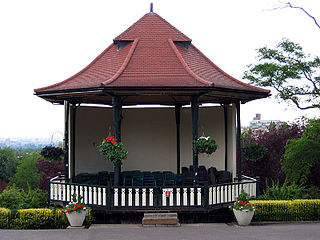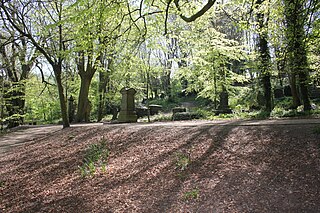
Weston Park Museum is a museum in Sheffield, South Yorkshire, England. It is one mile west of Sheffield city centre within Weston Park. It is Sheffield's largest museum and is housed in a Grade II* listed building and managed by Museums Sheffield. Until 2006 it was called Sheffield City Museum and Mappin Art Gallery.

A bandstand is a circular, semicircular or polygonal structure set in a park, garden, pier, or indoor space, designed to accommodate musical bands performing concerts. A simple construction, it both creates an ornamental focal point and also serves acoustic requirements while providing shelter for the changeable weather, if outdoors. In form bandstands resemble ornamental European garden gazebos modeled on outdoor open-sided pavilions found in Asian countries from early times.

Kelvingrove Park is a public park located on the River Kelvin in the West End of the city of Glasgow, Scotland, containing the Kelvingrove Art Gallery and Museum.

The General Cemetery in the City of Sheffield, England opened in 1836 and closed for burial in 1978. It was the principal cemetery in Victorian Sheffield with over 87,000 burials. Today it is a listed Landscape on the English Heritage National Register of Historic Parks and Gardens. It is also a Local Nature Reserve. It is owned by the City of Sheffield and managed on behalf of the city by a local community group, the Sheffield General Cemetery Trust.

Thorney is a village in the Peterborough unitary authority in the ceremonial county of Cambridgeshire, England. Located around eight miles (13 km) east of Peterborough city centre, on the A47.

Mowbray Park is a municipal park in the centre of Sunderland, Tyne and Wear, England, located a few hundred yards from the busy thoroughfares of Holmeside and Fawcett Street and bordered by Sunderland Museum and Winter Gardens to the north, Burdon Road to the west, Toward Road to the east and Park Road to the south. The park was voted best in Britain in 2008.
Sheffield has a large population of amateur, working and professional visual artists.

Johnstone Park is a landscaped garden in Geelong, Victoria, Australia. It is bounded by Railway Terrace, Gheringhap Street, Little Malop Street, Fenwick Street, and Mercer Street. The park is surrounded by civic buildings including the Geelong City Hall, Geelong Art Gallery, Geelong Library, Geelong Law Courts, and the Geelong Railway Station. A war memorial and bandstand feature in the centre of the park.

Godfrey Sykes was an English designer, metalworker, sculptor and painter.

Mappin & Webb (M&W) is an international jewellery company headquartered in England. Mappin & Webb traces its origins to a silver workshop founded in Sheffield in 1775. It now has retail stores throughout the UK.

The Saracen Foundry was the better-known name for the Possilpark, Glasgow–based foundry company W MacFarlane & Co. Ltd, founded and owned by Walter MacFarlane. MacFarlane's was the most important manufacturer of ornamental ironwork in Scotland.
Theodore Roosevelt spent his first summer in Oyster Bay with his family in 1874. Through the ensuing years as he rose to power, Oyster Bay would frequently serve as backdrop and stage on which many of his ambitions were realized. Several places connected to Theodore Roosevelt in his lifetime remain, while others have been lost. A number of efforts to memorialize Roosevelt in Oyster Bay have been made since his death in 1919.

The Memorial Gates at the University of Glasgow were erected in 1952 as a celebration of the university's quincentenary, or five hundredth anniversary. They form a portal through the University Avenue side of the perimeter fence around the university's current site on Gilmorehill. They stand before the Hunter memorial and Hunterian Museum, on the other side of the John McIntyre Building from the Main Gate. The large gates in the centre are generally locked, although the small pedestrian gates to the left and right are opened during the day. The gates bear the names of thirty distinguished figures associated with the university. The gates are protected as a category B listed building.

Memorials and monuments to victims of the sinking of the RMS Titanic exist in a number of places around the world associated with Titanic, notably in Belfast, Liverpool and Southampton in the United Kingdom; Halifax, Nova Scotia in Canada; and New York City and Washington, D.C. in the United States. The largest single contingent of victims came from Southampton, the home of most of the crew, which consequently has the greatest number of memorials. Titanic was built in Belfast, Northern Ireland, and had a "guarantee party" of engineers from shipbuilders Harland and Wolff aboard all of whom were lost in the disaster and are commemorated by a prominent memorial in the city. Other contingents of engineers aboard the ship came from the maritime cities of Liverpool in England and Glasgow in Scotland, which erected their own memorials. Several prominent victims, such as Titanic's captain, were commemorated individually. Elsewhere, in the United States and Australia, public memorials were erected to commemorate all the victims.

Queen's Park is a heritage-listed botanic garden at Sussex Street, Maryborough, Fraser Coast Region, Queensland, Australia. A reserve for the botanical gardens was gazetted in October 1873. It contains the Maryborough War Memorial. It was added to the Queensland Heritage Register on 21 October 1992.

The South Bank Lion is an 1837 sculpture in Central London. Since 1966 it has stood next to County Hall, on the South Bank of the River Thames. It is a significant depiction of a lion, along with the four that surround Nelson's Column in Trafalgar Square just across the river.

The Cavalry of the Empire Memorial, also known as the Cavalry Memorial, is a war memorial in Hyde Park, London. It commemorates the service of cavalry regiments in the First and Second World Wars. It became a Grade II listed building in 1987, and was promoted to Grade II* in November 2014.

Anzac Memorial Park is a heritage-listed memorial and park at The Strand, Townsville CBD, City of Townsville, Queensland, Australia. It was first built in 1912. It is also known as The Strand Park and Townsville War Memorial. It was added to the Queensland Heritage Register on 21 October 1992.

The York and Lancaster Regiment War Memorial is a war memorial to members of the York and Lancaster Regiment, in Weston Park, Sheffield, England. It was erected in the park in 1923 to commemorate the 8,814 members of the regiment who died in the First World War. The original inscription reads:
Elijah Howarth FRAS was an English museum curator.






















